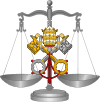Determinatio
 |
| Part of a series on the |
| Jurisprudence of Catholic canon law |
|---|
|
|
|
Trials and tribunals |
|
Canonical structures Particular churches
|
|
|
| Part of a series on |
| Thomas Aquinas |
|---|
 |
|
|
A determinatio is an authoritative determination by the legislator concerning the application of practical principles, that is not necessitated by deduction from natural[1] or divine law[2] but is based on the contingencies of practical judgement within the possibilities allowed by reason.[1]
In natural law jurisprudence, determinatio is the process of making natural law into positive law[3] In Catholic canon law, determinatio is the act by which natural law or divine positive law is made determinate in the canonical legal system as specific norms of law,[2] although the content of such law is still essentially that of divine law, which, together with canon law, forms "a single juridical system of law".[4]
The concept derives from the legal philosophy of Thomas Aquinas,[5] and continues to be a part of discussions in natural law theory.[3]
Canon law
Determinatio is a legal doctrine in the jurisprudence of the canon law of the Catholic Church.[2] It was imported from the legal philosophy of Thomas Aquinas.[6]
The general norms of divine or natural law serve as "shaping factors"[2] and "a necessary basis"[2] for the human-made canon law, but such general norms in themselves cannot have a greater legal effect until they are made into specific human laws, since the norms of divine law are "general and non-specific".[2]
But in the movement from the general to the concrete, there are sometimes many possibilities;[2] that is, divine or natural law can be made concrete in may different ways,[2] and all the legitimate alternatives are in line with the requirements of divine law.[2] Wherefore the legislator must make a determinatio and "opt or choose among them".[2]
References
- 1 2 Finnis, John. Aquinas, 266-271.
- 1 2 3 4 5 6 7 8 9 10 Hervada, Introduction, pg. 33
- 1 2 Waldron, Jeremy. Torture, Suicide, and Determinatio main page, Social Sciences Research Network. Accessed 22 March 2016.
- ↑ Hervada, Introduction, pg. 34
- ↑ Natural Law Theories, Stanford Encyclopedia of Philosophy, accessed 23 March 2016
- ↑ Hervada, Introduction, pg. 34 (citing Summa Theologiæ Ia-IIæ q.95 a.3)
Bibliography
- Finnis, John. Aquinas: Moral, Political, and Legal Theory (New York: Oxford University Press, 1998).
- Hervada, Javier. Introduction to the Study of Canon Law (Montréal: Wilson & Lafleur Ltée, 2007).
- Waldron, Jeremy (New York University School of Law), Torture, Suicide, and Determinatio; American Journal of Jurisprudence, Vol. 55, 2010; NYU School of Law, Public Law Research Paper No. 10-86.